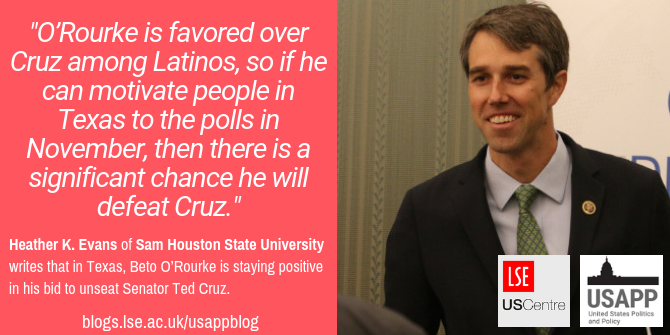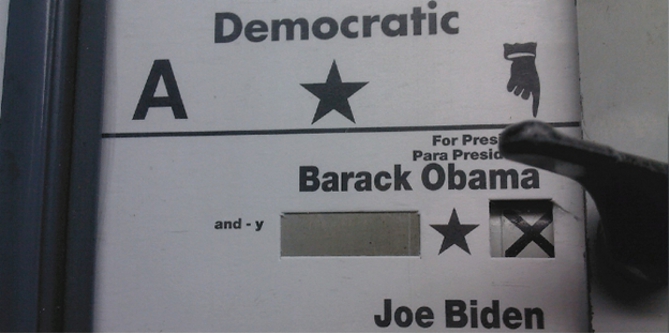 No Democrat has been elected to state-wide office in Texas since 1994. And yet, there are glimmers of hope for Democrat Beto O’Rourke who is challenging Republican Ted Cruz for his US Senate Seat in the Lone Star State. Heather K. Evans writes that surprisingly for a candidate challenging an incumbent, O’Rourke has released no attack ads or critical social media posts towards Cruz. With one of the lowest voter turnout rates in the country, she writes that O’Rourke’s best hope is to motivate Texans to head to the polls in November.
No Democrat has been elected to state-wide office in Texas since 1994. And yet, there are glimmers of hope for Democrat Beto O’Rourke who is challenging Republican Ted Cruz for his US Senate Seat in the Lone Star State. Heather K. Evans writes that surprisingly for a candidate challenging an incumbent, O’Rourke has released no attack ads or critical social media posts towards Cruz. With one of the lowest voter turnout rates in the country, she writes that O’Rourke’s best hope is to motivate Texans to head to the polls in November.
- This article is part of our blog series covering key 2018 US Senate races. Read the rest of our coverage. The series is published in tandem with the LSE US Centre’s public event, Making Sense of the Midterms on 7 November 2018.
One of the Senate races everyone has been paying attention to during this midterm election cycle is between Senator Ted Cruz and US House Representative Beto O’Rourke in Texas. There are so many things about this Senate election that are noteworthy. First, it is in Texas. The Lone Star State, which has not elected a Democrat to statewide public office since the early 1990s, is actually seeing a competitive race. The latest poll numbers show that the race itself is a toss-up. How is this possible? What makes a race competitive?
To have a competitive race, you need a strong challenger or an open-seat. In Texas, what we see is an incumbent that has some things moving in a positive direction for him (since he is a Republican), while other things are not. Rafael Edward “Ted” Cruz was elected to the US Senate from Texas in 2012. This means that he has only been in the Senate a single term. As the incumbent, he can campaign on the things that he has accomplished, but during his time as a Senator, he also campaigned for the presidency and lost. As his challenger pointed out at their first debate, Cruz spent more time campaigning in other states in 2016 than he did meeting with citizens in Texas, and he missed many votes in the Senate.
Ted Cruz – from Tea Party darling to 2016 presidential candidate
Ted Cruz won his US Senate seat in Texas in 2012, which at the time was an open seat contest. His election was a long shot at first as he was running against the current Lieutenant Governor David Dewhurst in the Republican primary. At this time in US politics, the Tea Party was gaining steam, and Sarah Palin, former Vice Presidential nominee from the Republican Party, endorsed Cruz for the seat, as did many other notable members of the Tea Party. He won the party’s nomination against Dewhurst and then sailed to victory with a 16-point lead over his Democratic challenger.
After assuming office, in 2013, Cruz became widely known for holding a 21-hour filibuster-style talk-a-thon regarding a budget bill that funded the Affordable Care Act. His filibuster played a large role in the 16-day government shutdown in October of that year. Cruz, however, continues to deny his role in the shutdown. Those in conservative circles praised his actions, and this led him to throw his hat in the presidential ring in 2015.
Cruz was one of the last few Republicans challenging Donald J. Trump for the Republican nomination in 2016, with Trump referring to him as “lying Ted Cruz” and mocking Cruz’s wife’s appearance and his father during the presidential primary.
In this upcoming Midterm election, Cruz has a leg up on his competition in terms of the ideological tilt of the state. As a Republican, Cruz has an advantage running in a state that has voted for conservative candidates for statewide political offices since 1994. He represents a state that voted for Trump over Clinton by 9 percent in 2016. Trump also carried 22 out of 36 congressional districts, which means that Cruz should see positive electoral results in those areas of the state. While these numbers are positive for Cruz’s re-election, studies have shown that the president’s party almost always loses seats during midterm elections. That doesn’t bode well for any Republicans’ re-election bids in 2018, including Cruz.
Beto O’Rourke – positivity and getting people to the polls
Cruz’s opponent is Robert Francis “Beto” O’Rourke. Beto is a very strong challenger. He has political experience, financial resources, and is well liked. O’Rourke is a three term representative from El Paso serving in the US House. This means that like Cruz, he can also campaign on the things he has done for Texans.
He also has money, and lots of it, and he’s not getting campaign donations in the ways that traditional politicians do. He has taken zero dollars from Political Action Committees during this campaign. During the second quarter of the year, he more than doubled the amount of money Cruz raised. The latest fundraising totals suggest that he has far outraised Cruz during the third quarter of this campaign season as well.

“2016 President’s Leadership Council” by Inter-American Dialogue is licensed under CC BY 2.0
Furthermore, O’Rourke is really well-liked. This past Saturday in Austin, he held a campaign rally with Willie Nelson and approximately 55,000 people came out. It set a record for the highest turnout since (and even including) the 2016 election. He’s been on the road visiting all of the 254 counties in TX, and his Facebook-live feeds show thousands of followers watching him at town halls and even while he orders Whataburger in the middle of the night. These events led Evan Smith of the Texas Tribune to remark this past Saturday that “[Cruz and Beto] are two years apart [in age]. In this campaign, [Cruz] seems 80 and [Beto] seems 20.”
Another surprising thing about this campaign is the level of negativity we are seeing during the race both on television and online. Cruz has been running negative television ads about O’Rourke’s background. O’Rourke is a former punk rocker and was also arrested for a DWI in 1998. O’Rourke has addressed his arrest record and has said that it was a “serious mistake for which there is no excuse.” He has yet to run any negative political ads about Cruz.
The tweets from these two candidates parallel what we are seeing on television. I study how candidates campaign on Twitter. In the first few weeks of September, O’Rourke sent zero tweets that were critical of his opponent. Approximately 14 percent of Cruz’s tweets were attack-style tweets about O’Rourke. This is surprising, since typically on Twitter, we find challengers going negative to convince constituents why they should be elected over the incumbent. We also find those in competitive races being more likely to go negative. Since this race is competitive, we should expect that both candidates will go negative. That isn’t the case. O’Rourke is staying positive and plans to remain positive.
The biggest problem that O’Rourke faces in this election is turnout, and the fact that Texas has consistently voted for Republicans since 1994. Texas has one of the lowest voter turnouts in the nation. While many people have been saying for years that Texas will eventually turn purple, it has yet to happen and seems like a dream that will never materialize. The population of Texas is shifting though, with Latinos poised to be the majority by around 2020. The problem, however, is that Latino turnout is low. In recent polling, O’Rourke is favored over Cruz among Latinos, so if he can motivate people in Texas to the polls in November, then there is a significant chance he will defeat Cruz.
Please read our comments policy before commenting.
Note: This article gives the views of the author, and not the position of USAPP – American Politics and Policy, nor the London School of Economics.
Shortened URL for this post: http://bit.ly/2EorHjJ
About the authors
 Heather Evans – Sam Houston State University
Heather Evans – Sam Houston State University
Heather Evans is an Associate Professor in the Department of Political Science at Sam Houston State University. Her primary research interests are political participation and behavior, public opinion, competitive elections, media and politics, the status of women in the political science discipline, and political psychology.





